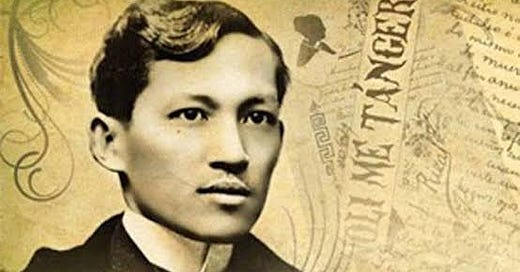Philippines' most revered national hero and first 'conscious' patriot was first betrayed by some 'misguided' pro-independence illustrados.
Then he was betrayed by Governor General Ramon Blanco.
However, Rizal's final betrayal took place years after his death in 1896. It was when the country's 'finally' freed Filipino elites embraced PROTECTIONIST-NATIONALIST POLICY, which strongly contradicted Rizal's political beliefs, life and experiences.
Rizal was a PATRIOT, not a "nationalist". There's a big difference between patriotism and nationalism, which is a recent invention/phenomenon.
Rizal's political philosophy was largely inspired by the French revolution. But who influenced the French?
In terms of political consciousness, Rizal was influenced by the "French Declaration of Rights of Man and of the Citizen".
Yet the French was influenced by the Americans, particularly by Thomas Jefferson who EDITED the "French Declaration of Rights of Man".
The preamble of the Declaration states: "The representatives of the French people, organized as a National Assembly, believing that the ignorance, neglect, or contempt of the rights of man are the sole cause of public calamities and of the corruption of governments, have determined to set forth in a solemn declaration the natural, unalienable, and sacred rights of man..."
I need to highlight this particular line: "that the ignorance, neglect, or contempt of the rights of man are the sole cause of public calamities and of the corruption of governments..."
Unlike the 1987 Philippine Constitution and the UN's Universal Declaration of Human Rights, the French Declaration (and the American Constitution, I must add) does NOT recognize or justify man's right to full employment and equality of employment opportunities; right to land; right to agricultural support; right to affordable and decent housing ; right to reproductive services, among others. These are all ANTI-RIGHTS or pseudo-rights.
It merely includes the following Articles:
1. Men are born and remain free and equal in rights. Social distinctions may be founded only upon the general good.
2. The aim of all political association is the preservation of the natural and imprescriptible rights of man. These rights are liberty, property, security, and resistance to oppression.
3. The principle of all sovereignty resides essentially in the nation. No body nor individual may exercise any authority which does not proceed directly from the nation.
4. Liberty consists in the freedom to do everything which injures no one else; hence the exercise of the natural rights of each man has no limits except those which assure to the other members of the society the enjoyment of the same rights. These limits can only be determined by law.
Thus, Rizal didn't believe man is politically entitled to things or services produced by others. That man has NO RIGHT TO THINGS or TO HAPPINESS just because he exists.
Like Jefferson and the French founders, Rizal believed that every man has the right to PURSUIT of-- or TO PURSUE-- happiness or things. mHowever, a few decades after his death, Filipino nationalists adopted a PROTECTIONIST/NATIONALIST politico-economic system for the Philippines.
1. They barred foreign professionals from practicing their respective professions in the Philippines.
-- This contradicts Rizal's professional experiences. Like modern-day OFW doctors, Rizal practiced medicine abroad, particularly in Hong Kong, which remains an open economy to this day.
Under the policy implemented by the Filipino nationalists, protectionists and UP graduates, foreigners were/are banned in the country.
2. They imposed the 60-40 ownership limit/arrangement against foreign investors/businesses.
-- Although Rizal didn't write much about his economic views, historians claimed he admire British "humane" occupation of Hong Kong.
In fact, Rizal even asked the British authorities to allow him to establish a Filipino colony in North Borneo (now Sabah). The British granted his request. This proves that Rizal was actually a PATRIOT and NOT a Filipino nationalist.
[TIP: Any Filipino historian or political analyst who made claims that Rizal was a "nationalist" without defining their terms is politically and philosophically CLUELESS.]
3. They imposed (e.g., 1935 and 1987 Constitutions) a total ban on foreign land ownership.
In contrast, the 1899 Constitution states: "Article 24. Foreigners may freely reside in Philippine territory, subject to legal dispositions regulating the matter; may engage in any occupation or profession for the exercise of which no special license is required by law to be issued by the national authorities."
Over 100 years ago, RP's first framers were as pro-liberty and pro-economic freedom as Jefferson, Singapore's Lee Kuan Yew, or Hong Kong's early founding fathers. They wanted foreigners to be part of their team and economy.
Rizal was the country's first CAPITALIST PRACTITIONER. He never relied on the Spanish government for the funding and building of water system in Dapitan and aqueduct system. Rather, he counted on people's voluntary support.
There must be some more profound reason why he titled his first novel "Noli Me Tangere" (Touch Me Not). It sounds almost the same-- or it almost has the same import-- as the French's "Laissez-nous faire" (Let us be or Leave us alone).
Rizal's Noli was his political protest against the Spanish theocratic BIG GOVERNMENT. In France, the term "Laissez-faire" was French businessman M. Le Gendre's protestation against his economically restrictive/intrusive French BIG GOVERNMENT.
Rizal was NO altruist. While he treated the indigent for free, he charged his wealthy patients, both locals and foreigners, for his medical services. His wealthy patients paid handsomely for his excellent services. In other words, he could afford to help the poor, and this is NON-SELF SACRIFICIAL. Take note that ALTRUISM means self-sacrifice or putting the welfare/interest of others above your own.
If Rizal were alive today, he'd have strongly rejected and ridiculed the country's current protectionist, blind nationalist politico-economic policy. Or: he'd have become an OFW and practice medicine abroad.
This year with the election of a dictator's son, Bongbong Marcos, Rizal must be rolling in his grave…





It would be interesting to see any of Rizal's works commending America's founders and pointing out how they have influenced him.